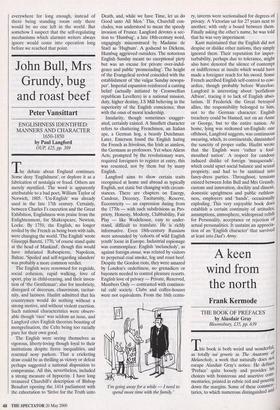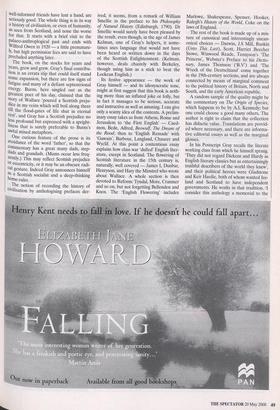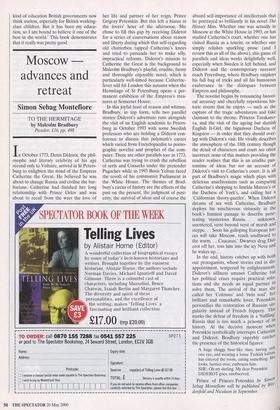A keen wind from the north
Frank Kermode
THE BOOK OF PREFACES by Alasdair Gray Bloomsbury, £35, pp. 639 his book is both weird and wonderful' as totally sui generic as The Anatomy of Melancho, a work that naturally does not escape Alasdair Gray's notice. He defines `Preface' quite loosely and provides his choices with boisterous and assertive com- mentaries, printed in rubric red and pouring down the margins. Some of these commen- taries, to which numerous distinguished and well-informed friends have lent a hand, are seriously good. The whole thing is in its way a history of civilisation, or even of humanity, as seen from Scotland, and none the worse for that. It starts with a brief visit to the palaeo-anthroplogical past and ends with Wilfred Owen in 1920 — a little premature- ly, but high permission fees are said to have precluded anything later.
The book, on the stocks for years and years, grew and grew. Gray's final contribu- tion is an errata slip that could itself stand some expansion, but there are few signs of fatigue and many of a defiant septentrional energy. Burns, here singled out as the greatest poet of his day, claimed that the story of Wallace 'poured a Scottish preju- dice in my veins which will boil along there till the flood-gates of life shut in eternal rest', and Gray has a Scottish prejudice no less profound but expressed with a spright- liness that is surely preferable to Bums's awful mixed metaphors. One curious feature of the prose is its avoidance of the word 'father', so that the commentary has a great many dads, step- dads and grandads. (Mums occur less freq- uently.) This may reflect Scottish prejudice or eccentricity, or it may be an obscure radi- cal gesture. Indeed Gray announces himself as a Scottish socialist and a deep-thinking home-ruler.
The notion of recording the history of civilisation by anthologising prefaces der- ived, it seems, from a remark of William Smellie in the preface to his Philosophy of Natural History (Edinburgh, 1790). Dr Smellie would surely have been pleased by the result, even though, in the age of James Kelman, one of Gray's helpers, it some- times uses language that would not have been heard or written down in the days of the Scottish Enlightenment. (Kelman, however, deals chastely with Berkeley, though using him as a stick to beat the Lockean English.) Its festive appearance — the work of Gray himself — and its idiosyncratic tone, might at first suggest that this book is noth- ing more than an inflated joke or folly, but in fact it manages to be serious, accurate and instructive as well as amusing. I can give only a scanty idea of the contents. A prelim- inary essay takes us from Athens, Rome and Jerusalem to 'the First English' — Caed- mon, Bede, Alfred, Beowulf, The Dream of the Rood; then to 'English Remade' with `Gawain', Barbour, Langland, Chaucer and Wyclif. At this point a contentious essay explains how class war 'dulled' English liter- ature, except in Scotland. The flowering of Scottish literature in the 15th century is, naturally, well covered — James I, Dunbar, Henryson, and Hary the Minstrel who wrote about Wallace. A whole section is then devoted to Reform: Tyndal, More, Cranmer and so on, but not forgetting Bellenden and Knox. The 'English Flowering' includes Marlowe, Shakespeare, Spenser, Hooker, Ralegh's History of the World, Coke on the laws of England.
The rest of the book is made up of a mix- ture of canonical and interestingly uncan- onical choices — Darwin, J.S Mill, Ruskin (Unto This Last), Scott, Harriet Beecher Stowe, Winwood Reade, Tennyson's 'The Princess', Webster's Preface to his Dictio- nary, James Thomson (`B.V') and 'The Wreck of the Deutschland' come together in the 19th-century sections, and are always connected by means of marginal comment to the political history of Britain, North and South, and the early American republic.
A random sample of the quality might be the commentary on The Origin of Species, which happens to be by A.L Kennedy; but one could choose a good many others. The author is right to claim that the collection has didactic value. Translations are provid- ed where necessary, and there are informa- tive editorial essays as well as the marginal glosses.
In his Postscript Gray recalls the literate working class from which he himself sprang. `They did not regard Dickens and Hardy as English literary classics but as entertainingly truthful describers of the world they knew', and their political heroes were Gladstone and Keir Hardie, both of whom wanted Ire- land and Scotland to have independent governments. He works in that tradition. 'I consider this anthology a memorial to the kind of education British governments now think useless, especially for British working- class children. But it has been my educa- tion, so I am bound to believe it one of the best in the world.' This book demonstrates that it really was pretty good.











































































 Previous page
Previous page